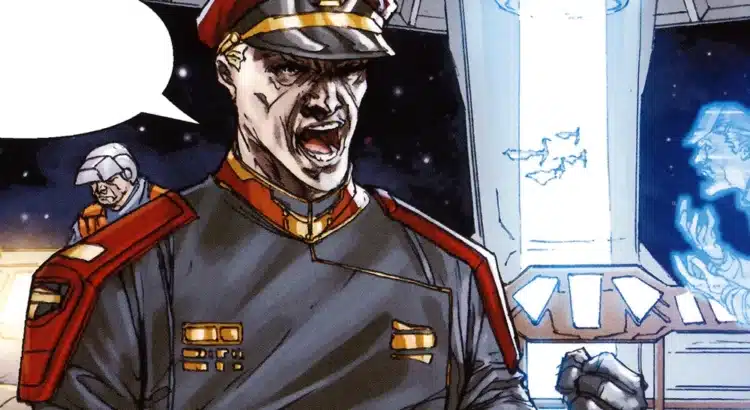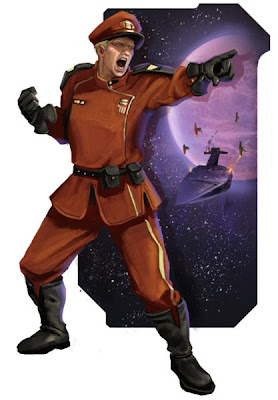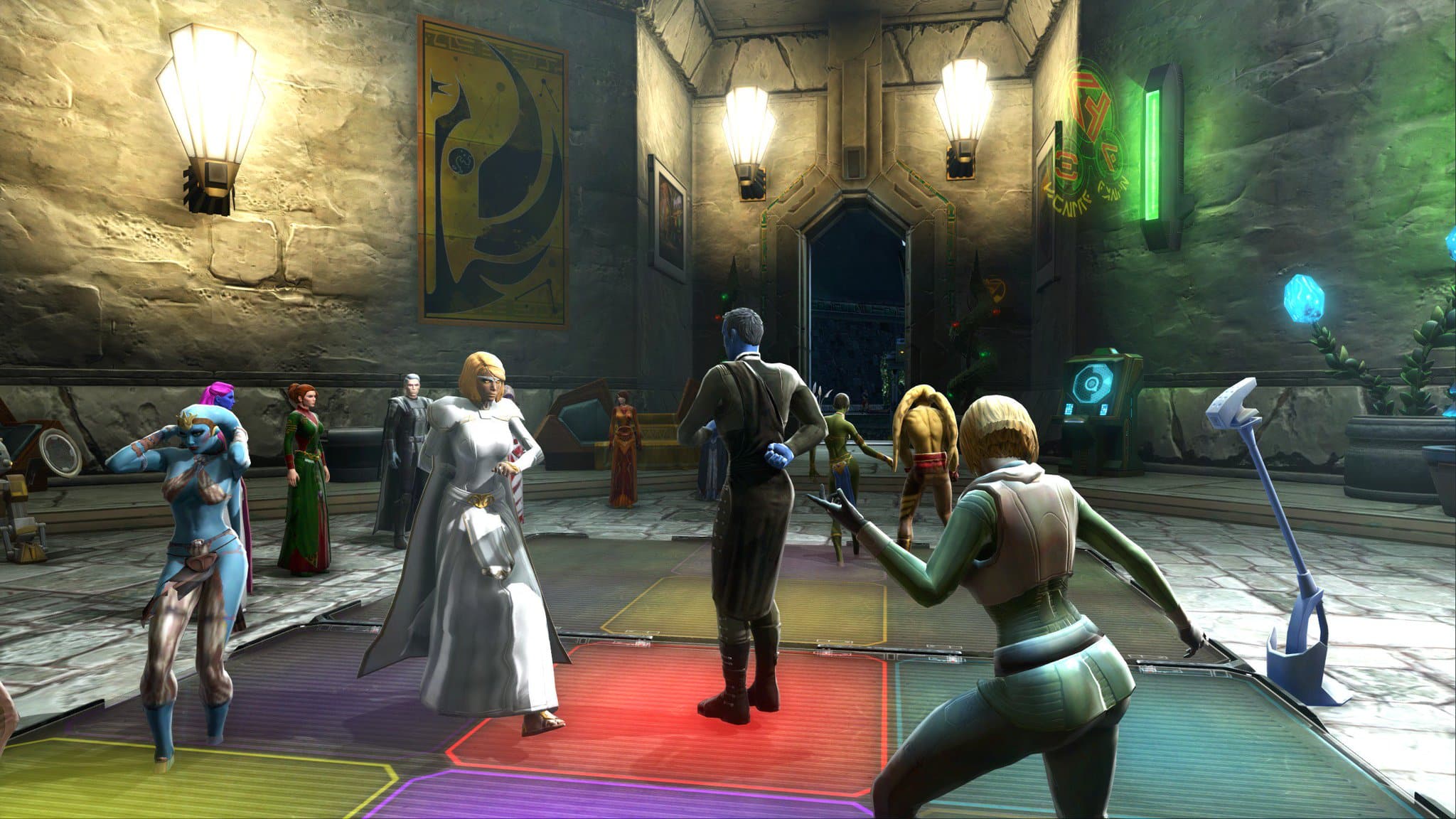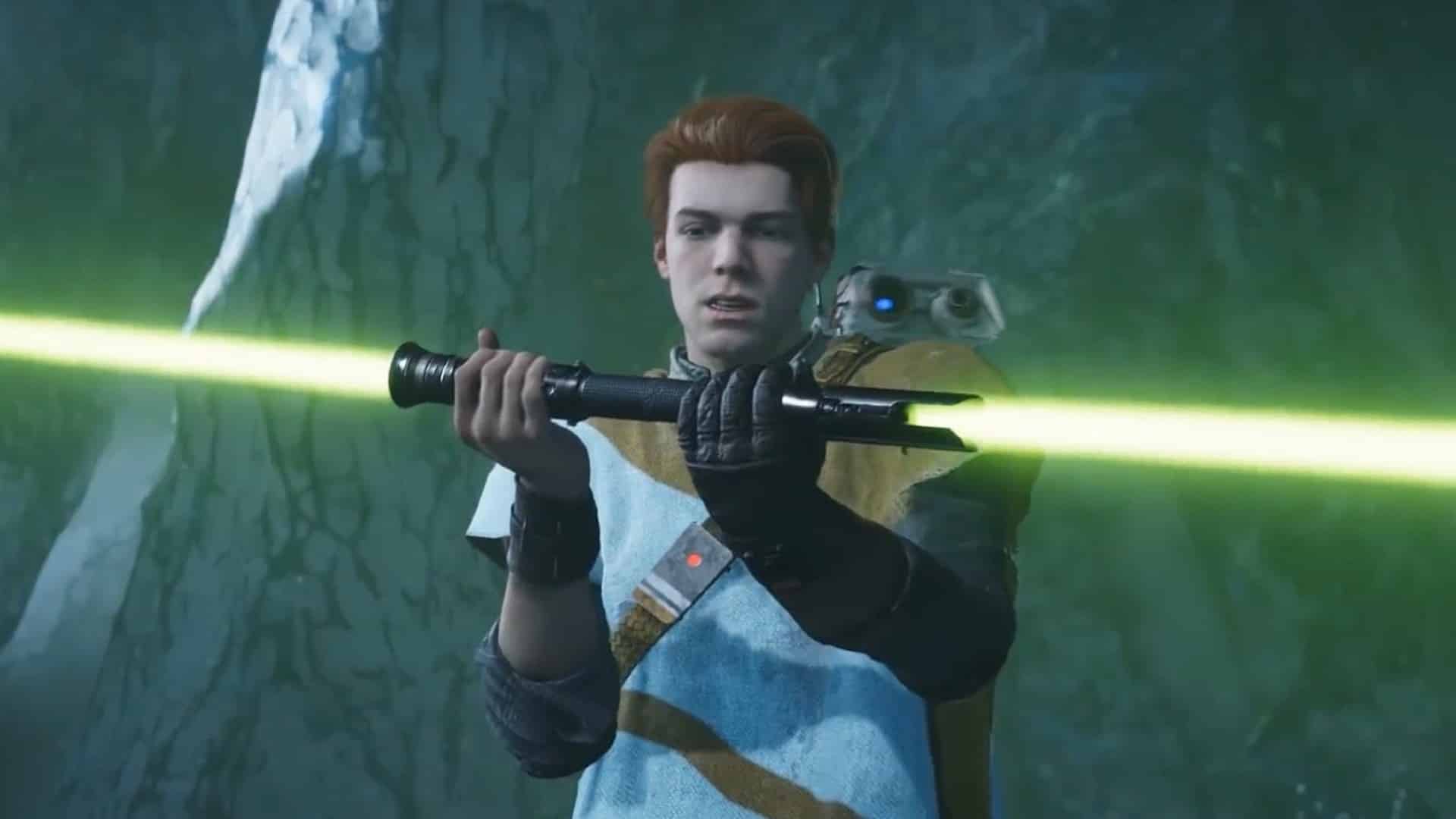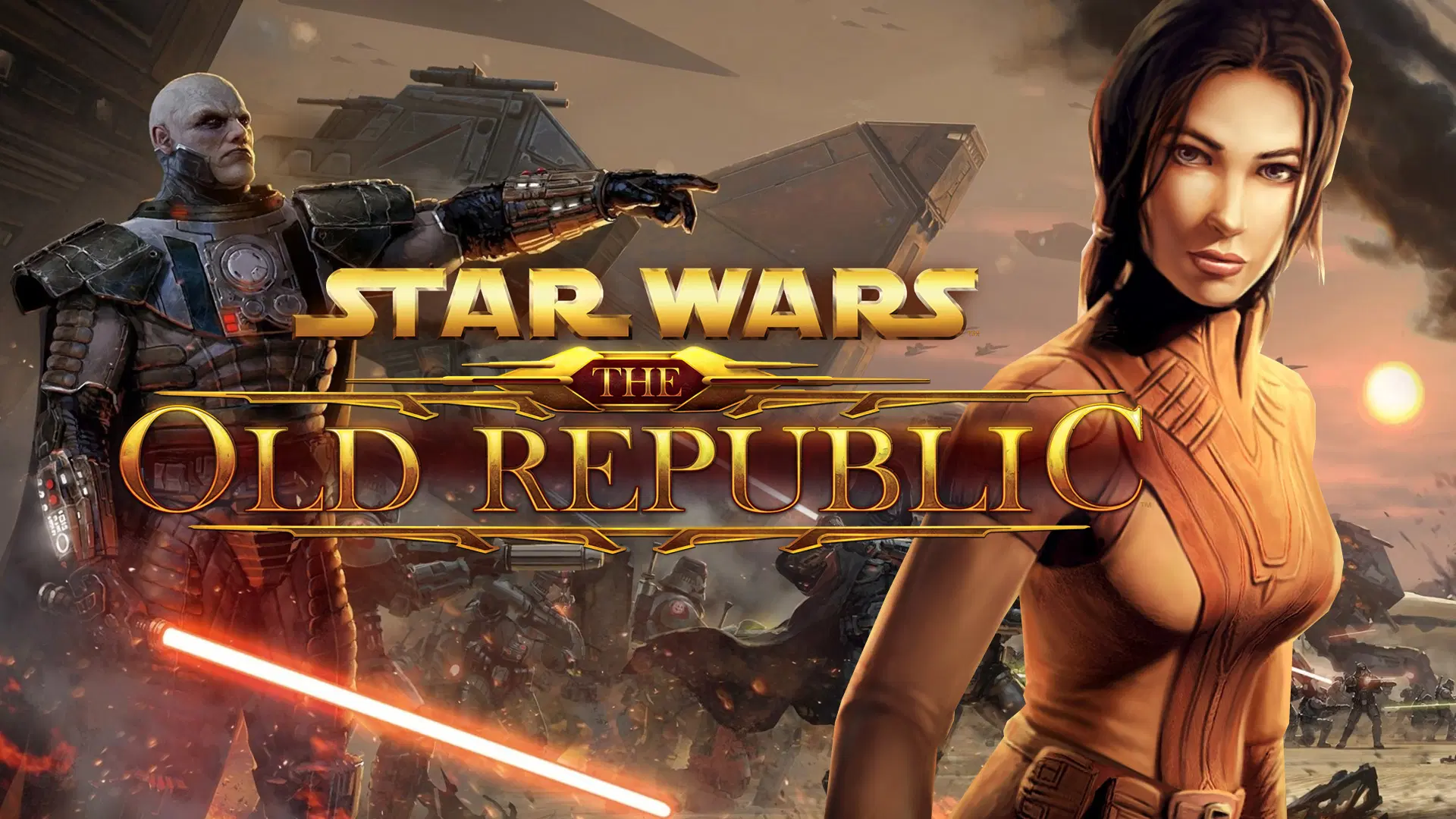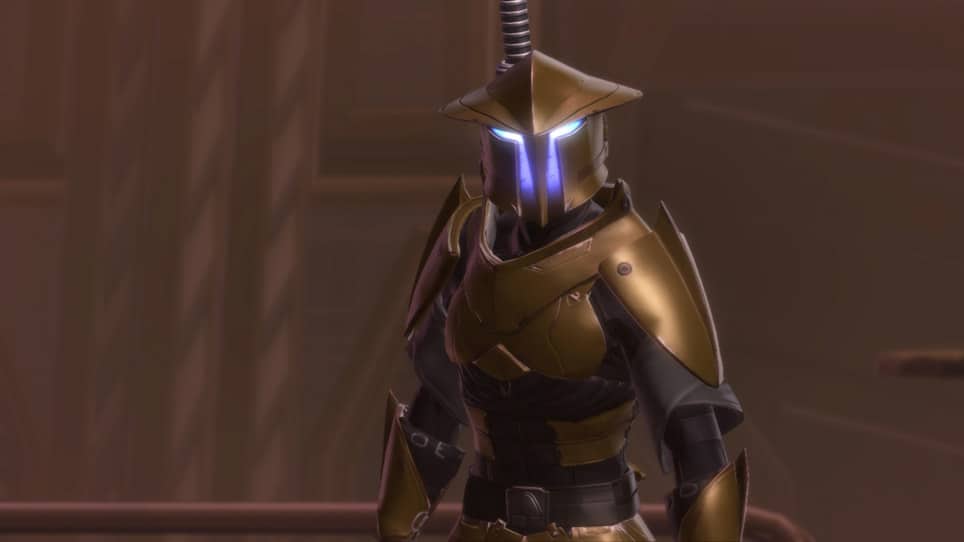Saul Karath is a name that resonates with fans of the Star Wars universe, particularly those who have ventured into the rich narratives of Knights of the Old Republic (KOTOR). Once a decorated Republic admiral, Saul Karath’s descent into treachery and his eventual role as a Sith admiral is one of the most intriguing and tragic arcs in Star Wars lore. This article explores his story, from his origins to his lasting legacy in the broader Star Wars universe.
Chapter 1: The Origins of Saul Karath
A Star is Born in the Republic Navy
Saul Karath’s journey began in the heart of the Galactic Republic, where he quickly established himself as a rising star in the Republic Navy. Picture a young officer with a sharp mind and an even sharper uniform, who had all the qualities of a future military legend: tactical genius, unwavering dedication, and the kind of charisma that could inspire entire fleets. It wasn’t long before Karath’s name was being whispered in the halls of power, and his superiors were taking notice.
Karath’s early career was filled with victories that would make any officer proud. He had a knack for outmaneuvering his enemies, whether they were pirates, rogue planets, or any of the countless threats to the Republic. His record was spotless, his reputation impeccable, and his rise through the ranks seemed as inevitable as the sunset on Coruscant. But, as we’ll see, even the brightest stars can have a dark side.
The Mentor with a Mission
Saul Karath wasn’t just a great commander; he was also a mentor to many of the Republic’s brightest young officers. Among those who served under him were two names you might recognize: Revan and Malak. Yes, the Revan and Malak, who would go on to become some of the most infamous figures in galactic history. At this stage, though, they were just promising young Jedi with a lot to learn, and Karath was the man to teach them.
Karath’s mentoring style was a mix of tough love and tactical brilliance. He wasn’t the kind of mentor who would pat you on the back and tell you everything was going to be okay. No, he was more likely to hand you a battle plan and tell you to figure it out. But this approach worked; it forged strong, capable leaders who could think on their feet and adapt to any situation. Revan and Malak, in particular, thrived under Karath’s tutelage, soaking up his lessons in strategy, leadership, and the harsh realities of war.
Cracks in the Armor: Early Disillusionment
Even as Saul Karath’s star continued to rise, there were signs that all was not well beneath the surface. The endless wars and the political maneuvering of the Republic’s leaders began to wear on him. Karath was a man of action, a soldier who believed in clear objectives and decisive victories. But the Republic, with its bureaucracy and endless debates, often failed to provide the leadership he felt was necessary to win the day.
This growing sense of frustration and disillusionment wasn’t something Karath talked about openly, but it was there, simmering beneath the surface. He started to question the Republic’s ability to defend the galaxy, and his once-unshakeable loyalty began to waver. It was a subtle shift at first, but one that would have profound consequences for Karath—and for the galaxy as a whole.
The Beginning of the End
The early signs of Saul Karath’s disillusionment were like cracks in a dam, barely noticeable at first but destined to lead to a catastrophic break. As the Republic’s challenges grew and the stakes became higher, Karath found himself increasingly at odds with the very institution he had dedicated his life to. The ideals that had once driven him—loyalty, duty, and honor—began to feel like chains, binding him to a cause that no longer made sense.
It’s easy to see how this might happen. After all, Karath wasn’t just dealing with the enemy on the battlefield; he was also grappling with the internal politics and inefficiencies of the Republic. For a man who valued action and results, the Republic’s indecision was maddening. And so, the seeds of his eventual betrayal were sown, long before he ever set foot on the path to the dark side.
Conclusion: A Hero on the Brink
Saul Karath’s origins are a study in contrasts. Here was a man who had everything—talent, respect, and a promising future—yet found himself increasingly disillusioned with the very ideals that had once driven him. His early career was marked by brilliance and success, but the cracks in his loyalty to the Republic were beginning to show. As we’ll see in the chapters to come, these early signs of disillusionment would set Karath on a path from which there was no return, leading to one of the most dramatic falls from grace in Star Wars history.
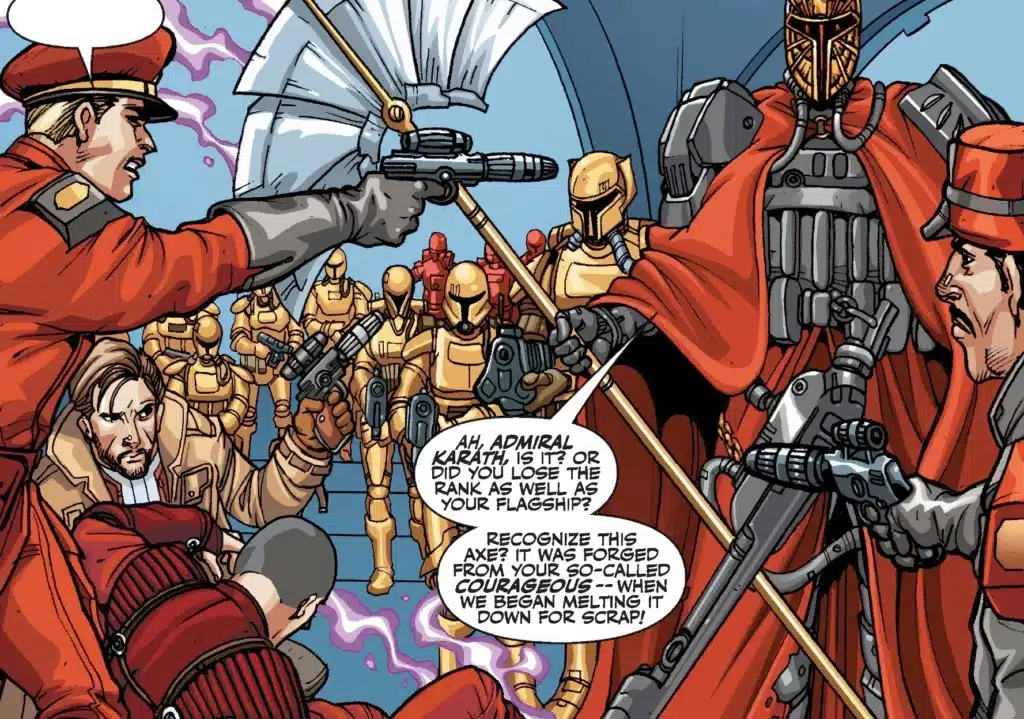
Chapter 2: Saul Karath and the Mandalorian Wars
A Galaxy in Flames
The Mandalorian Wars were the kind of conflict that keeps generals up at night—and Saul Karath was no exception. The galaxy was teetering on the brink, with the Mandalorians launching an all-out assault that threatened to overwhelm the Republic. For Karath, this wasn’t just another war; it was a test of everything he believed in. The stakes were higher than ever, and the pressure to protect the Republic was immense. But as the war dragged on, it became clear that things weren’t going according to plan.
Imagine being in Karath’s shoes: a seasoned admiral with the weight of the galaxy on his shoulders, watching as the Republic struggled to contain the Mandalorian onslaught. The war was brutal, with battles that pushed even the most experienced soldiers to their limits. Karath, a man of action, was forced to grapple with the frustrations of a seemingly endless conflict, where every victory came at a staggering cost. The idealism that had once fueled his loyalty to the Republic began to erode, replaced by a growing sense of disillusionment.
The Rise of Revan and Malak
Amid the chaos, two figures emerged as unlikely heroes: Revan and Malak. These former Jedi, disillusioned by the Jedi Council’s refusal to intervene, took matters into their own hands, rallying forces to take the fight to the Mandalorians. For Karath, who had mentored these young men, their actions were both inspiring and troubling. On the one hand, they were achieving the kind of victories that the Republic desperately needed. On the other hand, their methods were… unconventional, to say the least.
Karath couldn’t help but admire Revan and Malak’s resolve. They were doing what needed to be done, regardless of the consequences. In them, Karath saw a reflection of his own frustrations—a desire to cut through the bureaucracy and get results. But with every victory, the line between heroism and ruthlessness became blurrier. Revan and Malak were willing to make sacrifices that Karath, once a staunch defender of the Republic’s ideals, found increasingly difficult to justify. Yet, their success was undeniable, and Karath’s loyalty to the Republic continued to waver.
The Breaking Point: Bombardment of Telos IV
The moment that defined Saul Karath’s descent into darkness was the bombardment of Telos IV, a planet that was utterly destroyed under his orders. This wasn’t just another battle—it was an atrocity, a calculated act of terror meant to send a message. Karath, who had once prided himself on his tactical brilliance and adherence to a code of honor, had crossed a line that could never be uncrossed.
What would drive a decorated Republic admiral to commit such an act? The answer lies in Karath’s growing disillusionment and his belief that drastic measures were necessary to end the war. The Republic’s leadership had failed, in his eyes, to protect the galaxy, and Karath was desperate to do whatever it took to secure victory—even if it meant turning his back on everything he once stood for. The destruction of Telos IV wasn’t just a military decision; it was a personal breaking point for Karath, marking his final, irrevocable shift to the dark side.
The Consequences of Betrayal
The aftermath of Telos IV was a turning point not only for Saul Karath but for the entire galaxy. The Republic, already weakened by the Mandalorian Wars, was further destabilized by Karath’s betrayal. The once-respected admiral had become a symbol of treachery, and his actions only served to strengthen the Sith’s grip on the galaxy. For Karath, there was no going back. He had chosen his path, and it was one that would lead him to serve as a Sith admiral under Darth Malak.
Karath’s decision to align with the Sith wasn’t born out of a desire for power or a lust for domination. It was, in his mind, a necessary evil—a way to bring order to a galaxy that had fallen into chaos. But as he embraced his new role, the man who had once been a hero of the Republic was lost, replaced by a figure who had sacrificed everything, including his own soul, for a cause that was no longer just.
Conclusion: The Mandalorian Wars as a Catalyst
The Mandalorian Wars were the crucible in which Saul Karath’s fate was forged. What began as a conflict to defend the Republic became the catalyst for his ultimate fall from grace. Karath’s journey from respected admiral to Sith enforcer is a tragic tale of disillusionment, betrayal, and the cost of war. The decisions he made during this period would shape the rest of his life—and the fate of the galaxy. As we move forward in his story, it’s clear that the Mandalorian Wars didn’t just change the galaxy; they changed Saul Karath, turning him into one of the most complex and tragic figures in Star Wars history.
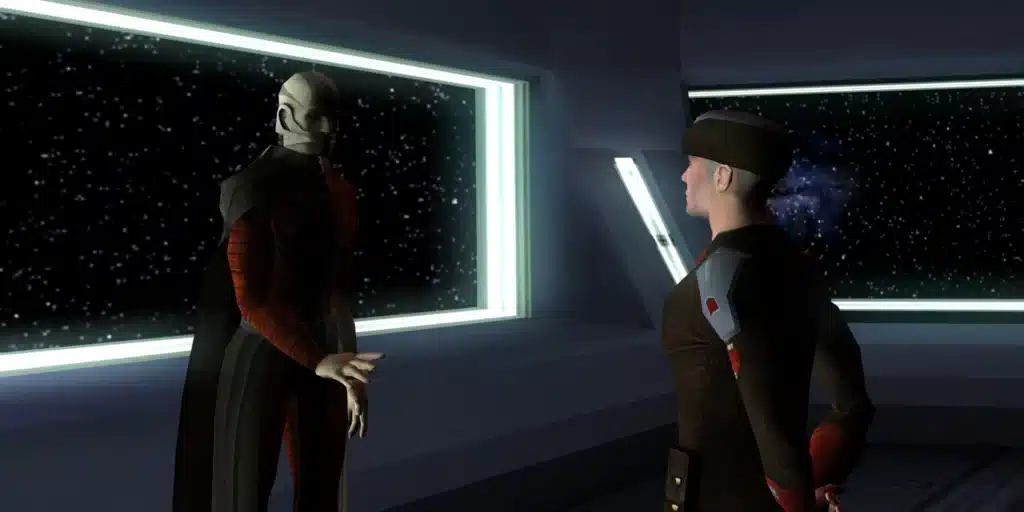
Chapter 3: Saul Karath’s Role in Knights of the Old Republic
The Sith Admiral in the Spotlight
When players first encounter Saul Karath in Knights of the Old Republic (KOTOR), it’s clear that this is no ordinary villain. Karath, now a high-ranking Sith admiral, is a man who has fully embraced the dark side. But what makes his role so compelling is the depth of his character—he’s not just another bad guy in a black cloak; he’s a fallen hero, someone who once fought for the Republic but now stands against it.
In KOTOR, Karath is portrayed as a formidable antagonist, commanding the Sith fleet with the same tactical brilliance that once made him a hero of the Republic. His fall from grace is evident in his interactions with the player, particularly if the player character is Revan, the former Sith Lord turned hero. The tension between Karath’s past loyalty to Revan and his current allegiance to the Sith adds a layer of complexity to their encounters, making each confrontation more than just a simple battle between good and evil.
A Complex Villain with a History
What sets Saul Karath apart from many other villains in the Star Wars universe is the richness of his backstory and the moral ambiguity of his actions. In KOTOR, Karath isn’t depicted as a power-hungry megalomaniac. Instead, he comes across as a man who believes he’s doing what is necessary for the greater good—even if that means siding with the Sith. His betrayal of the Republic isn’t motivated by greed or malice but by a deep sense of disillusionment and a belief that the Republic’s failure to protect the galaxy justifies his actions.
This moral complexity makes Karath a fascinating character to interact with. Players are forced to grapple with the idea that this once-noble man has willingly chosen a darker path, not because he craves power, but because he genuinely believes that the Sith offer a more decisive, if brutal, solution to the galaxy’s problems. This perspective challenges players to consider the thin line between heroism and villainy, and how easily one can slip from one to the other.
The Personal Stakes
Karath’s role in KOTOR isn’t just about his strategic genius or his command of the Sith fleet—it’s deeply personal. His past relationships with key characters, including Revan and Malak, add emotional weight to his story. Karath isn’t just another enemy to be defeated; he’s someone who has a history with the player, someone who was once an ally, a mentor, even a friend.
This personal connection comes to a head during the game’s narrative, particularly in the scenes where Karath confronts the player. Depending on the player’s choices, these interactions can be charged with regret, anger, or even a twisted sense of camaraderie. Karath’s dialogue reflects the conflict within him—he knows what he’s done and what he’s become, and there’s a sense of tragic inevitability in his fate. The player’s conversations with Karath often feel like a battle of wits and ideals, where both parties are acutely aware of the stakes involved.
The Battle at the Leviathan
One of the most iconic moments in KOTOR is the battle aboard the Leviathan, the flagship of Saul Karath’s fleet. This encounter is a climactic point in the game, where the player and Karath finally come face to face. The build-up to this moment is intense, with the player navigating the ship and fighting through waves of enemies to reach Karath’s command center. The confrontation with Karath is more than just a physical battle; it’s a confrontation of ideologies and past loyalties.
During this encounter, Karath reveals key plot points, including Revan’s true identity, in a moment that shocks both the player and their companions. The emotional weight of this revelation, combined with the history between the characters, makes the battle against Karath one of the most memorable in the game. Whether the player feels anger, pity, or a sense of tragic loss, the encounter with Karath leaves a lasting impression, cementing his role as a pivotal figure in the KOTOR storyline.
The Tragic End
Karath’s story in KOTOR ultimately ends in tragedy. Depending on the player’s choices, his death can be a moment of catharsis or sorrow. In his final moments, Karath often reflects on the path that led him to this point, acknowledging the weight of his decisions and the cost of his betrayal. This introspection adds depth to his character, making him more than just a villain; he’s a tragic figure whose choices have led him to a place from which there is no return.
For the player, Karath’s death is not just the defeat of an enemy, but the end of a complex relationship. Whether the player views Karath as a traitor who got what he deserved or as a fallen hero who lost his way, his demise is a powerful reminder of the consequences of betrayal and the allure of the dark side.
Conclusion: A Villain of Depth and Complexity
Saul Karath’s role in Knights of the Old Republic is a masterclass in character development. He’s a villain with depth, history, and a tragic arc that challenges players to think beyond the simple dichotomy of good versus evil. Karath’s story is a poignant exploration of how even the most noble of intentions can lead to the darkest of paths. His journey from Republic hero to Sith admiral is not just a tale of betrayal; it’s a reminder of the fine line between heroism and villainy, and how easily one can slip from one to the other. As we continue to explore his legacy in the following chapters, it’s clear that Saul Karath’s impact on the Star Wars universe is as profound as it is tragic.
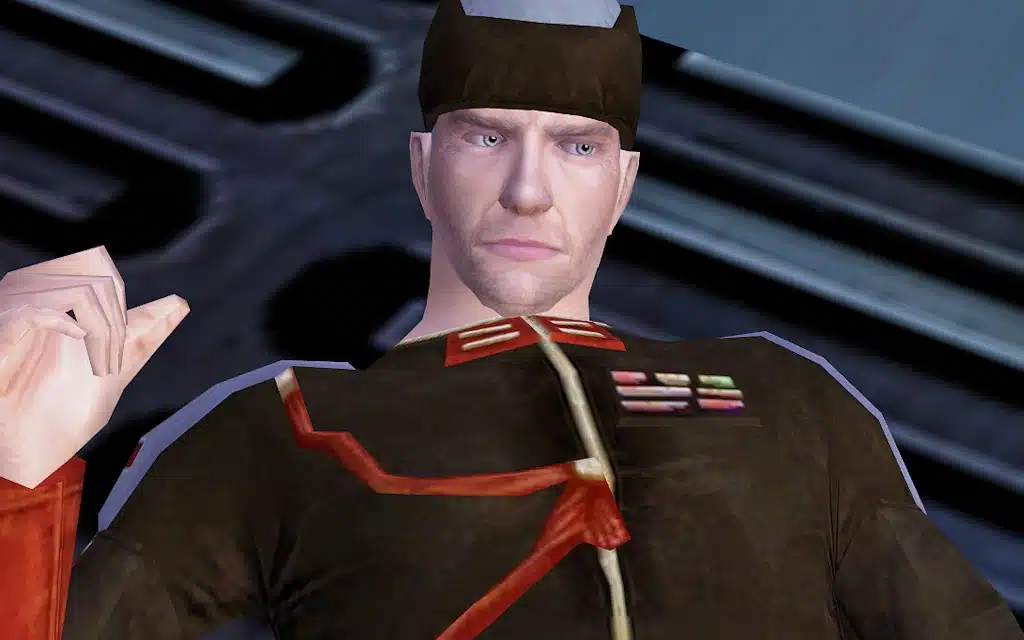
Chapter 4: Saul Karath’s Legacy in The Old Republic and Beyond
A Lasting Impact on the Galaxy
Saul Karath may have met his end in Knights of the Old Republic (KOTOR), but his legacy continues to echo throughout the galaxy. His actions, particularly his betrayal of the Republic and the bombardment of Telos IV, have left an indelible mark on the Star Wars universe. The repercussions of his choices are felt not only in the immediate aftermath of KOTOR but also in the broader narratives explored in Star Wars: The Old Republic (SWTOR) and other expanded media.
Karath’s story serves as a cautionary tale, a reminder of how a respected leader can fall from grace and become a symbol of treachery. The destruction of Telos IV, a once-thriving planet reduced to ruins by Karath’s orders, is often referenced in later Star Wars stories as a pivotal moment that fueled the rise of the Sith and deepened the fractures within the Republic. It’s the kind of event that historians in the Star Wars universe would look back on and say, “That’s where things really started to go downhill.”
Influence on Future Sith Leaders
Karath’s fall from Republic hero to Sith admiral also set a precedent for other characters in the Star Wars universe. His journey demonstrated how easily one could be seduced by the dark side, particularly when driven by disillusionment and a desire for decisive action. Future Sith leaders and generals, both in SWTOR and other Star Wars media, often mirror Karath’s arc—starting as noble warriors or leaders who gradually compromise their morals in the pursuit of power or security.
In SWTOR, for example, players encounter various Sith characters whose paths echo Karath’s, showing how the dark side preys on those who are disillusioned with the status quo. Karath’s legacy serves as a template for these characters, providing a narrative foundation for exploring the seductive nature of power and the tragic consequences of abandoning one’s principles.
A Presence in Expanded Universe Content
While Saul Karath’s story is primarily told in KOTOR, his legacy extends into the broader Star Wars Expanded Universe, including comics, novels, and other media. These stories often delve deeper into his backstory, exploring the factors that led to his betrayal and the aftermath of his actions. For fans who crave more details about Karath’s life and motivations, these expanded narratives provide a richer understanding of his character.
In these stories, Karath is often portrayed as a complex figure, someone who genuinely believed that his actions were for the greater good, even as he crossed lines that many would consider unforgivable. His character is used to explore themes of loyalty, duty, and the fine line between heroism and villainy. By examining his story from multiple angles, the Expanded Universe adds layers to Karath’s legacy, making him one of the more nuanced antagonists in Star Wars lore.
The Ongoing Discussion Among Fans
Saul Karath remains a topic of discussion among Star Wars fans, particularly those who have a deep appreciation for the storytelling in KOTOR. His character sparks debates about morality, leadership, and the nature of betrayal. Fans often discuss whether Karath was a victim of circumstance, driven to the dark side by forces beyond his control, or whether he consciously chose a path of destruction. These discussions are a testament to the depth of his character and the impact his story has had on the Star Wars community.
In fan forums and online discussions, Karath’s decisions are often analyzed in the context of the broader themes of the Star Wars saga. His story serves as a touchstone for conversations about the dangers of unchecked power and the consequences of losing faith in one’s ideals. For many fans, Karath’s legacy is a reminder that even the most well-intentioned leaders can fall, and that the path to the dark side is often paved with good intentions.
Conclusion: A Legacy of Complexity and Tragedy
Saul Karath’s legacy in The Old Republic and beyond is one of complexity and tragedy. His journey from a respected Republic admiral to a Sith enforcer is a powerful narrative that explores the darker side of loyalty, duty, and the pursuit of order. Karath’s actions have left a lasting mark on the Star Wars universe, influencing characters, stories, and discussions long after his death in KOTOR. As fans continue to explore the rich tapestry of Star Wars lore, Karath’s story serves as a poignant reminder of the consequences of betrayal and the thin line between hero and villain.
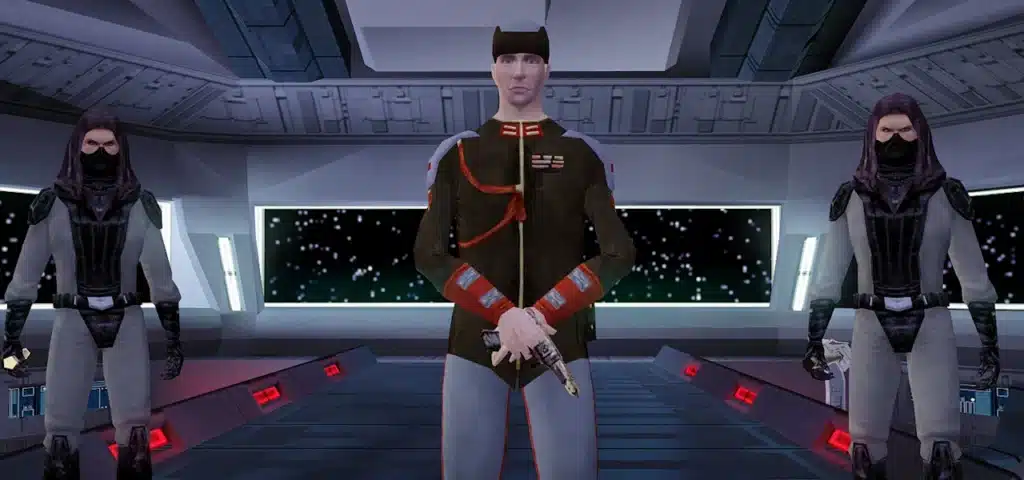
Chapter 5: The Enduring Impact of Saul Karath
A Legacy that Lingers
Saul Karath’s story doesn’t just end with his demise in Knights of the Old Republic (KOTOR); in many ways, it begins there. His choices, his fall from grace, and his complex personality have left an enduring mark on the Star Wars universe that continues to resonate with fans and storytellers alike. Karath is a character who reminds us that the line between hero and villain is often razor-thin, and that even the most well-intentioned leaders can lose their way.
Karath’s story serves as a haunting reminder that no one is immune to the temptations of power and the dangers of disillusionment. His legacy isn’t just about the actions he took—like the bombardment of Telos IV—but about the ripple effects those actions had across the galaxy. Even in his absence, the consequences of his choices continue to shape the Star Wars narrative, influencing events, characters, and the broader themes that define the saga.
Influence on Modern Star Wars Media
In modern Star Wars media, Saul Karath’s influence can be felt in various ways. His story has inspired similar character arcs in both video games and other forms of media, where characters grapple with the same themes of loyalty, duty, and the descent into darkness. Karath’s legacy serves as a narrative blueprint for exploring how good intentions can pave the way to devastating outcomes.
For instance, the themes of betrayal and moral ambiguity that Karath embodies are often revisited in new Star Wars content, from animated series to novels. His character provides a reference point for understanding how the dark side can corrupt even the most dedicated individuals. In a galaxy where the battle between light and dark is ever-present, Karath’s story offers a nuanced take on the complexities of that struggle.
A Staple in Star Wars Fandom
Among Star Wars fans, Saul Karath has secured a place as one of the more intriguing and tragic figures in the Expanded Universe. Discussions about Karath often center around his motivations and the moral gray areas that define his character. Fans appreciate the depth and complexity of Karath’s story, which stands out as one of the more layered narratives in the KOTOR series.
Karath’s legacy has also been kept alive through fan fiction, art, and discussions that continue to explore his character in new ways. Whether through detailed analyses of his decisions or creative reinterpretations of his story, fans have found countless ways to keep Karath’s memory alive within the Star Wars community. His character’s tragic arc resonates with those who appreciate stories that go beyond simple good versus evil dichotomies.
Lessons from Saul Karath’s Downfall
One of the key lessons from Saul Karath’s story is the danger of letting disillusionment drive your actions. Karath’s fall wasn’t immediate; it was the result of a long process of losing faith in the Republic and becoming increasingly desperate to impose order on a chaotic galaxy. This gradual descent serves as a warning that even the strongest moral compasses can be corrupted when hope is lost and the desire for control takes over.
In the broader context of Star Wars, Karath’s story is a testament to the complexities of leadership and the heavy burden that comes with power. It’s a reminder that every decision, no matter how well-intentioned, can have far-reaching consequences. For Karath, those consequences were devastating, not just for himself, but for the galaxy at large.
Conclusion: A Character Whose Impact Transcends the Game
Saul Karath’s enduring impact on the Star Wars universe is a testament to the power of well-crafted storytelling. His journey from a respected Republic admiral to a fallen Sith enforcer is a tragic tale that continues to captivate fans and enrich the Star Wars narrative. Through his story, we are reminded of the thin line between heroism and villainy, and the importance of staying true to one’s principles, even in the face of overwhelming adversity.
Karath’s legacy is one of complexity, tragedy, and the haunting realization that even the best of us can fall. As Star Wars continues to evolve, Saul Karath remains a character whose story will be told, retold, and analyzed for years to come, ensuring that his impact on the galaxy far, far away is never forgotten.
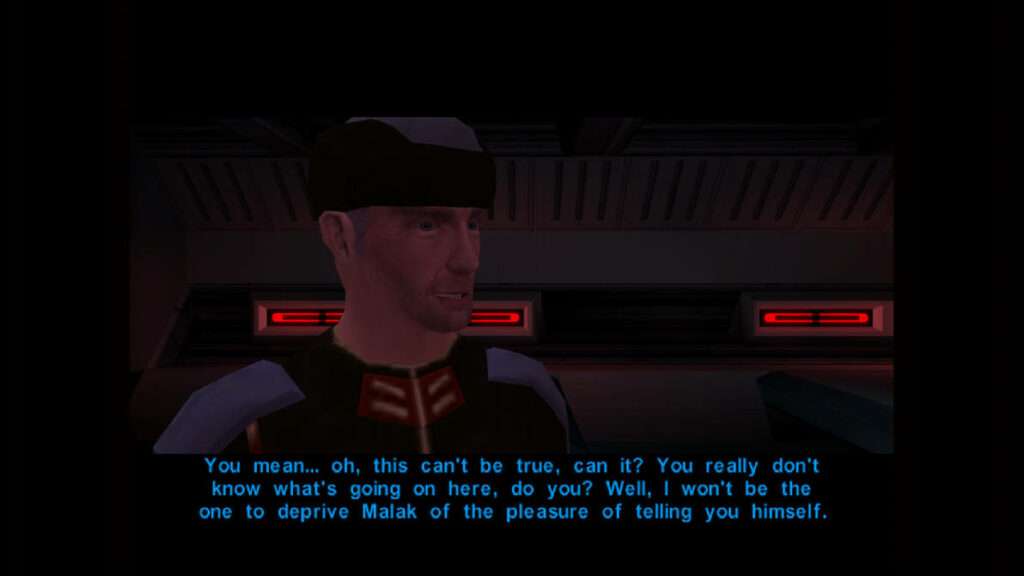
Conclusion: The Tragic Tale of Saul Karath
Saul Karath’s journey from a decorated Republic admiral to a fallen Sith enforcer is a tragic tale that weaves together themes of loyalty, disillusionment, and the corrupting influence of power. Each chapter of his life, from his early days as a mentor to Revan and Malak, through his pivotal role in the Mandalorian Wars, to his eventual betrayal and tragic end in Knights of the Old Republic, paints a picture of a man whose fall from grace had far-reaching consequences.
Karath’s story is a reminder that even those with the noblest intentions can lose their way, especially when faced with the harsh realities of war and the failures of leadership. His legacy, as explored in The Old Republic and beyond, continues to influence the Star Wars narrative, serving as a cautionary tale about the dangers of losing sight of one’s principles in the pursuit of order.
In the end, Saul Karath is more than just a villain; he is a complex character whose decisions shaped the galaxy in profound ways. His impact on the Star Wars universe is a testament to the depth of the storytelling in KOTOR, and his legacy will continue to resonate with fans as a powerful exploration of the thin line between heroism and villainy.

